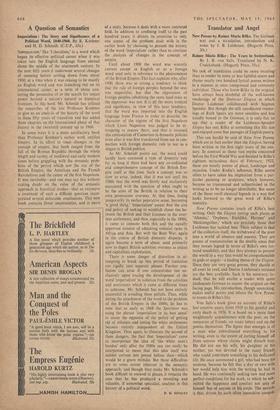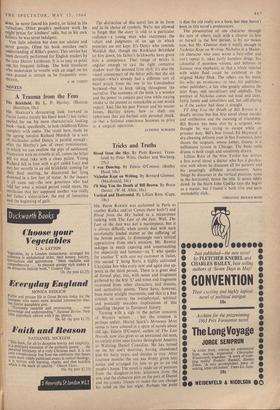Translator and Angel
Rainer Maria Rilke : The Years in Switzerland, By J. R. von Salis. Translated by N. K. Cruickshank. (Hogarth Press, 35s.)
No task of translation could be more exacting than to render in more or less faithful metre and rhyme nearly two hundred lyrical poems written in a manner at. once compressed and extremely individual. Those who know Rilke in the original have always been doubtful of the well-known renderings of the Duineser Elegien in which Doctor Leishman collaborated with Stephen Spender. But though the still uncollected render- ings of Ruth Speirs are more sensitive and less timidly bound to the German, it is only fair to say that a reader of the Leishman-Spender Elegies has met Rilke at something like life size and enjoyed some fine passages of English poetry.
This can hardly be said of these New Poems, which are in fact earlier than the Elegien, having been written in the first eight years of the cen- tury. In contrast to those vast myths conceived before the First World War and finished in Rilke's eighteen miraculous days of February, 1922, these are mostly poems of place, landscape and occasion. Under Rodin's influence, Rilke seems often to have taken his inspiration from a par- ticular painting or sculpture, which however, became so transmuted and subjectivised in the writing as to be no longer identifiable. But some of the finest retell classical legends in a way that looks forward to the great work of Rilke's maturity.
New Poems contains much of Rilke's best writing. Only the Elegien outtop such pieces as 'Alkestis,"Orpheus, Euridike, Hermes' and Iletarengritber,' which are precisely those that Leishman has tackled best. Their subject is that of the collection itself, the withdrawal of the poet into a world of absence and essence. They are poems of transmutation in the double sense that they restate legend in terms of Rilke's own tor- tured sensibility, and that they attempt to present the world in a way that would be comprehensible to gods or angels—a leading theme of the Elegien. Since they are very great poems, they should at all costs be read, and Doctor Leishman's versions are the best available. Such is his accuracy, in- deed, that he will enable a reader with quite inadequate German to master the original on the facing page. His introduction, though unexciting, makes useful points and relates the New Poems to events in Rilke's life.
Von Salis's book gives an account of Rilke's last creative years, from 1919 to his painful and early death in 1926. It is based on a more than neighbourly acquaintance with the poet, on the memories of friends, on many letters and on the poems themselves. The figure that emerges is of a man who subordinated everything to his writing, even to the extent of cutting himself off from anyone whose claims might disturb him. He did not see his wife, his daughter or his mother, yet was devoted to the many friends who could contribute something to his dedicated life. He once summoned a girl, who had been his mistress, because he felt that a day or two with her would help him with the writing he had la hand. He was continually seeking new and more perfect conditions for his work, to which he sub- mitted the happiness and comfort not only of himself but of anyone in his circle. The miracle is that, driven by such often insensitive compol-
THE SPECTATOR, YkAY 15, 1964 Might praise for kindness' sake, but to his own failures he was never indulgent. never gossips. Often his book enriches one's sions, he never forced his poetry, or failed in his understanding of Rilke's poetry. This service has the later Doctor Leishman. It is to easy to point Who undertakes to wrestle with an angel on his been devoutly performed for English readers by own ground is certain to be frequently over- thrown. valuations. Other people's mediocre work he out his frequent failings. The bold translator Von Salis admires but does not adulate and J. M. COHEN NOVELS































 Previous page
Previous page